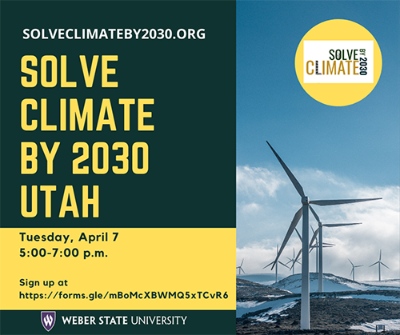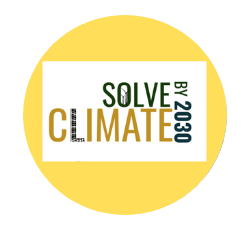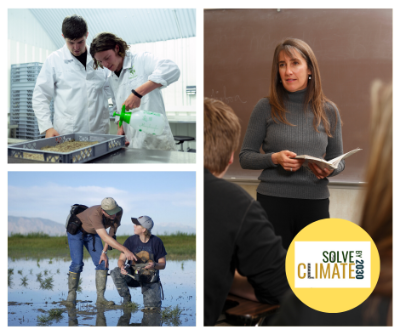WSU Part of National Climate Change Webinar
Although the COVID-19 crisis is demanding our attention, Weber State University’s Sustainability Practices and Research Center (SPARC) remains focused on the looming crisis of climate change and how Utahns can make a difference.
SPARC, along with WSU’s Environmental Initiatives Committee, will host a statewide live-webcast on climate solutions, April 7 from 5-7 p.m., as part of a nationwide virtual teach-in/discussion event called Solve Climate by 2030.
 Due to its leadership and involvement in sustainability, Weber State was asked to serve as the host for the Utah webinar. The series will include 52 university-hosted webinars, including one in almost every state, Puerto Rico and five countries internationally. The webinars are focused on three ambitious but feasible state and local ideas to help solve climate change by 2030.
Due to its leadership and involvement in sustainability, Weber State was asked to serve as the host for the Utah webinar. The series will include 52 university-hosted webinars, including one in almost every state, Puerto Rico and five countries internationally. The webinars are focused on three ambitious but feasible state and local ideas to help solve climate change by 2030.
“We will focus on what Utahns can do to help improve our future in the face of climate change,” said Alice Mulder, SPARC director. “We want to translate the solutions identified by the state experts to actions we can each take on the ground. This next decade is our window to make a significant difference in reducing the impacts of our changing climate.”
COVID-19 has shown how fragile our health and economic systems are in the face of extreme events. Our best climate scientists have also told us clearly that, unchecked, climate change will turn our lives into a series of extreme events around the world. There is still time to change that future.
The Center for Environmental Policy at Bard College in New York initiated the project. According to Eban Goodstein, center director, solving the energy-half of climate change by 2030 is looking more, not less likely, than it was four years ago. The cost of solar, wind, batteries and electric vehicles have plummeted. In many cases, they are already less expensive than polluting fossil fuels — and getting cheaper every day.
“The important action on climate is now in cities, at local electric utilities and with states,” Goodstein said. “The challenge is bad local laws and regulations that are slowing the clean-energy revolution.”
 Weber State’s webinar will begin with a short presentation from Bard College followed by a Utah-focused panel presentation and community discussion.
Weber State’s webinar will begin with a short presentation from Bard College followed by a Utah-focused panel presentation and community discussion.
Faculty and teachers across the country, and across disciplines, will assign the webinars as homework to springboard discussion for climate solutions and energy justice. Subject-area online resources are available to #MakeClimateaClass.
To watch the free webinar, Register here. For more information, or if you would like a link to the recording, contact katherinemeyr@weber.edu
Weber State Sustainability Projects
Through its multiple sustainability efforts, Weber State has saved $1,984,280 on its water and energy costs in fiscal year 2019. Since 2007, WSU has reduced its direct carbon footprint by 39 percent, while the university has grown by more than 475,252 square feet.
The university is in the process of installing its first solar covered-parking array over the W10 lot, on the north west side of the Ogden campus. The array will house 550 kilowatts of solar panels that will feed directly into Lindquist Hall and the campus electrical grid. The power produced by the array is expected to offset 80 percent of Lindquist Hall’s energy consumption.
Other Weber State’s sustainability efforts have included a series of ground source wells that help heat and cool campus. The university built a seven-acre solar field that supplies the energy needs to the WSU Davis campus in Layton. Students are also involved in a collaborative project with Ogden City to construct a net zero home in Ogden as part of an international competition hosted by the Department of Energy. You can learn more about Weber State sustainability work at this link.
 Webinar Schedule
Webinar Schedule
5-5:10 p.m. Welcome
- Eban Goodstein, Bard College
5:10 - 6 p.m. Climate Solutions Live Panel
- Sarah Wright, Utah Clean Energy Executive Director
- Brad Mortensen, Weber State University President
- Aimee Urbina, Sunrise Movement Coordinator, Ogden
- Piper Christian, youth activist leader and University of Utah student
6-7 p.m. Moderated Community Dialogue
For more information about SPARC, visit this link.
Visit weber.edu/wsutoday for more news about Weber State University.
Allison Barlow Hess, Public Relations director
801-626-7948 • ahess@weber.edu- Contact:
Alice Mulder, Sustainability Practices and Research Center director
801-626-6198 • amulder@weber.edu
